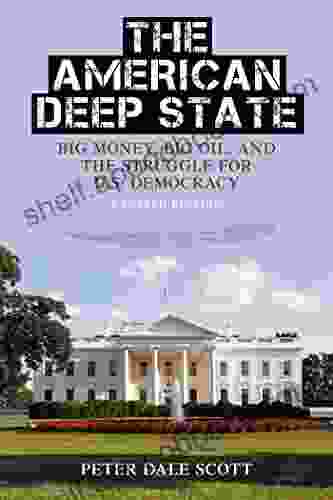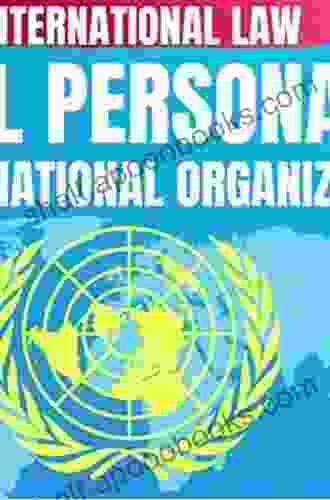The Law of International Organizations: Unraveling the Legal Framework of Global Cooperation

In today's interconnected world, international organizations play a pivotal role in shaping global governance and fostering cooperation among nations. Understanding the legal framework that governs these organizations is essential for anyone seeking to navigate the complexities of international relations and participate effectively in the global arena. The Law of International Organizations provides a comprehensive exploration of the legal principles, structures, and functions of these organizations, offering invaluable insights into the intricate web of international law.
4.3 out of 5
| Language | : | English |
| File size | : | 2205 KB |
| Text-to-Speech | : | Enabled |
| Screen Reader | : | Supported |
| Enhanced typesetting | : | Enabled |
| Word Wise | : | Enabled |
| Print length | : | 450 pages |
The Concept of International Organizations
International organizations are entities established by a treaty or other international agreement between two or more states. They are independent of the states that created them and have their own legal personality. These organizations differ from other international actors, such as states and individuals, in that they are not subject to the domestic laws of any particular country. Instead, they are governed by the international law principles enshrined in their constituent treaties and other applicable international instruments.
Types of International Organizations
The landscape of international organizations is vast and diverse, encompassing a wide range of entities with varying mandates and functions. They can be classified based on their scope, membership, and objectives. Some prominent types of international organizations include:
* Intergovernmental organizations: These organizations are established by agreements between governments, such as the United Nations, the European Union, and the World Trade Organization. * Non-governmental organizations (NGOs): These organizations are not established by governments but play an active role in international affairs, advocating for specific causes or providing humanitarian assistance. Examples include Amnesty International, the Red Cross, and the World Wildlife Fund. * Supranational organizations: These organizations have limited supranational authority over their member states. The European Union is an example of a supranational organization.
The Legal Basis of International Organizations
The legal basis of international organizations lies in the treaties or other international agreements that establish them. These agreements define the organization's mandate, structure, functions, and powers. They also establish the organization's legal personality and capacity to act on the international stage. The constituent treaty is the primary source of law for each international organization.
The Structure and Organs of International Organizations
International organizations are typically structured with various organs, each with specific responsibilities and functions. These organs may include:
* Plenary Assembly: This is the main decision-making body of the organization, composed of representatives from all member states. * Executive Board: This body is responsible for implementing the decisions of the Plenary Assembly and overseeing the day-to-day operations of the organization. * Secretariat: This administrative body provides support and expertise to the other organs of the organization.
The Functions and Powers of International Organizations
International organizations perform a wide range of functions, depending on their mandate. These may include:
* Promoting cooperation: Organizations can facilitate cooperation between member states on issues of common interest, such as economic development, environmental protection, and human rights. * Establishing standards: Organizations can set standards and norms in various fields, such as health, safety, and environmental protection. * Resolving disputes: Some organizations, such as the International Court of Justice and the International Tribunal for the Law of the Sea, have the authority to resolve disputes between member states. * Providing assistance: Organizations can provide technical and financial assistance to member states, particularly in the areas of development and humanitarian aid.
The Legal Status and Privileges of International Organizations
International organizations enjoy certain legal immunities and privileges that enable them to carry out their functions effectively. These immunities include:
* Sovereign immunity: Organizations are immune from the jurisdiction of national courts. * Diplomatic immunity: Organization officials enjoy diplomatic immunity from arrest, detention, and prosecution. * Fiscal immunity: Organizations are exempt from taxes and customs duties.
The Role of International Organizations in Global Governance
International organizations play a crucial role in global governance by:
* Promoting cooperation: They provide a platform for states to work together and address common challenges. * Upholding international law: They establish and enforce international norms and standards. * Promoting peace and security: They help prevent conflict and maintain international peace and security. * Advancing sustainable development: They promote economic and social development while protecting the environment.
The Challenges Facing International Organizations
International organizations face various challenges, including:
* Lack of enforcement powers: Some organizations lack the authority to enforce their decisions or resolutions. * Political influence: Powerful member states can sometimes exert undue influence on decision-making. * Bureaucracy and inefficiency: Complex structures and decision-making processes can lead to bureaucracy and inefficiency.
The Law of International Organizations is a complex and dynamic field that continues to evolve. Understanding this legal framework is essential for professionals in international law, international relations, and global governance. The book provides a comprehensive and up-to-date analysis of the legal principles, structures, functions, and challenges facing international organizations. It is an invaluable resource for anyone seeking to delve into the intricate web of international cooperation and global governance.
4.3 out of 5
| Language | : | English |
| File size | : | 2205 KB |
| Text-to-Speech | : | Enabled |
| Screen Reader | : | Supported |
| Enhanced typesetting | : | Enabled |
| Word Wise | : | Enabled |
| Print length | : | 450 pages |
Do you want to contribute by writing guest posts on this blog?
Please contact us and send us a resume of previous articles that you have written.
 Book
Book Novel
Novel Page
Page Chapter
Chapter Text
Text Story
Story Genre
Genre Reader
Reader Library
Library Paperback
Paperback E-book
E-book Magazine
Magazine Newspaper
Newspaper Paragraph
Paragraph Sentence
Sentence Bookmark
Bookmark Shelf
Shelf Glossary
Glossary Bibliography
Bibliography Foreword
Foreword Preface
Preface Synopsis
Synopsis Annotation
Annotation Footnote
Footnote Manuscript
Manuscript Scroll
Scroll Codex
Codex Tome
Tome Bestseller
Bestseller Classics
Classics Library card
Library card Narrative
Narrative Biography
Biography Autobiography
Autobiography Memoir
Memoir Reference
Reference Encyclopedia
Encyclopedia Virginia Cox
Virginia Cox Jf Lewis
Jf Lewis Suzi Stembridge
Suzi Stembridge Rohini Hensman
Rohini Hensman John B Judis
John B Judis Kelly Cibrian
Kelly Cibrian Donna Harrington
Donna Harrington Sarah Jessen
Sarah Jessen Gayle Allen
Gayle Allen Precarity Lab
Precarity Lab John Oliver
John Oliver Donna Collinsworth
Donna Collinsworth Joseph A Lieberman
Joseph A Lieberman Jeffrey Ford
Jeffrey Ford Robert W Valenti
Robert W Valenti Jennifer Heynen
Jennifer Heynen Timothy D Kanold
Timothy D Kanold Shirley Jordan
Shirley Jordan Joanne Fluke
Joanne Fluke Ellen Warren
Ellen Warren
Light bulbAdvertise smarter! Our strategic ad space ensures maximum exposure. Reserve your spot today!

 Carson BlairEmbark on a Nostalgic Journey into the Essence of Country Life: "Growing Up...
Carson BlairEmbark on a Nostalgic Journey into the Essence of Country Life: "Growing Up... Brody PowellFollow ·9.2k
Brody PowellFollow ·9.2k Michael CrichtonFollow ·15.7k
Michael CrichtonFollow ·15.7k Patrick HayesFollow ·3.7k
Patrick HayesFollow ·3.7k Jeffrey HayesFollow ·3.7k
Jeffrey HayesFollow ·3.7k Theodore MitchellFollow ·7.6k
Theodore MitchellFollow ·7.6k Vernon BlairFollow ·9k
Vernon BlairFollow ·9k Henry JamesFollow ·14.4k
Henry JamesFollow ·14.4k Douglas FosterFollow ·9.2k
Douglas FosterFollow ·9.2k

 Larry Reed
Larry ReedBig Money, Big Oil, and the Struggle for Democracy
By [Author's Name] In this...

 Jackson Blair
Jackson BlairUnleash Your Creativity with The Ultimate Guide to Cricut...
Welcome to the extraordinary world of Cricut...

 Glen Powell
Glen PowellTo the American Public: Uncovering the Hidden Truths and...
An Incisive and Urgent Call to...

 Bryce Foster
Bryce FosterUltimate Guide to Starting a Mini Food Truck Business:...
: Embracing the Mobile Culinary...

 John Steinbeck
John SteinbeckHow To Make Different Styles Of Flute From Around The...
Embark on a...
4.3 out of 5
| Language | : | English |
| File size | : | 2205 KB |
| Text-to-Speech | : | Enabled |
| Screen Reader | : | Supported |
| Enhanced typesetting | : | Enabled |
| Word Wise | : | Enabled |
| Print length | : | 450 pages |











